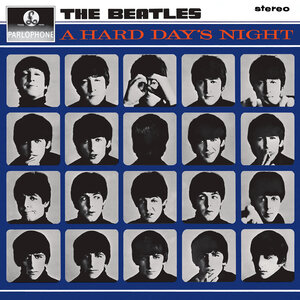
A Hard Day's Night is the third studio album by the English rock band the Beatles, released on 10 July 1964 by Parlophone, with side one containing songs from the soundtrack to their film of the same name. The American version of the album was released two weeks earlier, on 26 June 1964 by United Artists Records, with a different track listing including some from George Martin's film score. Unlike their first two albums, all 13 tracks on A Hard Day's Night were written by John Lennon and Paul McCartney.
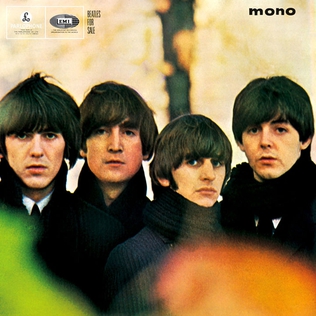
Beatles for Sale is the fourth studio album by the English rock band the Beatles. It was released on 4 December 1964 in the United Kingdom on EMI's Parlophone label. The album marked a departure from the upbeat tone that had characterised the Beatles' previous work, partly due to the band's exhaustion after a series of tours that had established them as a worldwide phenomenon in 1964. Beatles for Sale was not widely available in the US until 1987, when the Beatles' catalogue was standardised for release on CD. Instead, eight of the album's fourteen tracks appeared on Capitol Records' concurrent release, Beatles '65, issued in North America only.
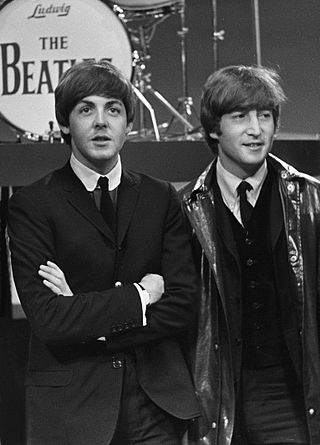
Lennon–McCartney is the songwriting partnership between the English musicians John Lennon and Paul McCartney of the Beatles. It is widely considered one of the greatest, best known and most successful musical collaborations ever by records sold, with the Beatles selling over 600 million records worldwide as of 2004. Between 5 October 1962 and 8 May 1970, the partnership published approximately 180 jointly credited songs, of which the vast majority were recorded by the Beatles, forming the bulk of their catalogue.
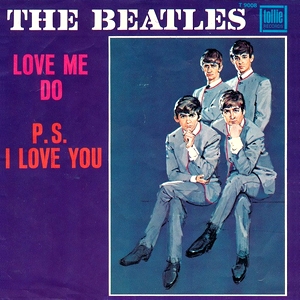
"Love Me Do" is the debut single by the English rock band the Beatles, backed by "P.S. I Love You". When the single was originally released in the United Kingdom on 5 October 1962, it peaked at number 17. It was released in the United States in 1964 and topped the nation's song chart. Re-released in 1982 as part of EMI's Beatles 20th anniversary, it re-entered the UK charts and peaked at number 4. "Love Me Do" also topped the charts in Australia and New Zealand.
"Across the Universe" is a song by the English rock band the Beatles. It was written by John Lennon and credited to Lennon–McCartney. The song first appeared on the 1969 various artists' charity compilation album No One's Gonna Change Our World and later, in a different form, on their 1970 album Let It Be, the group's final released studio album. The original version featured on two different albums both titled Rarities: a 1978 British release and a 1980 US release. It was also included on their 1988 album Past Masters, Volume Two. The song has been covered by many artists, including David Bowie on his 1975 album Young Americans, which featured contributions from Lennon.
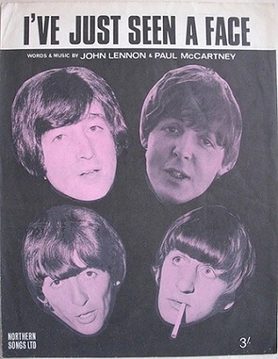
"I've Just Seen a Face" is a song by the English rock band the Beatles. It was released in August 1965 on their album Help!, except in North America, where it appeared as the opening track on the December 1965 release Rubber Soul. Written and sung by Paul McCartney, the song is credited to the Lennon–McCartney partnership. The song is a cheerful love ballad, its lyrics discussing a love at first sight while conveying an adrenaline rush the singer experiences that makes him both enthusiastic and inarticulate.

"Baby's in Black" is a song by the English rock band the Beatles, co-written by John Lennon and Paul McCartney. It appears on the United Kingdom album Beatles for Sale and on the United States album Beatles '65, both released in 1964.
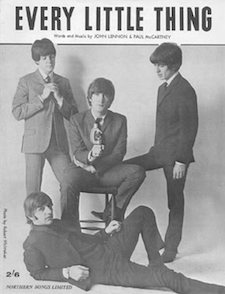
"Every Little Thing" is a song by the English rock band the Beatles from their album Beatles for Sale, issued in the UK in December 1964. Credited to Lennon–McCartney, it was written by Paul McCartney. Capitol Records first issued the song in the US on Beatles VI in June 1965. The track is an early example of the Beatles' use of non-rock instrumentation on a recording, through the addition of timpani drum over the choruses.
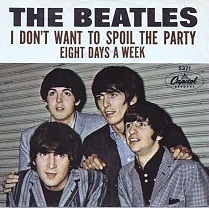
"I Don't Want to Spoil the Party" is a song by the English rock band the Beatles, written by John Lennon and credited to Lennon–McCartney. It was featured as the twelfth track on the 1964 album Beatles for Sale. "I Don't Want to Spoil the Party" was also released on the Beatles for Sale EP. It was later released as the B-side of the US single "Eight Days a Week", and then as the fifth track on the North America-only album Beatles VI. The song reached number 39 on the Billboard Hot 100.
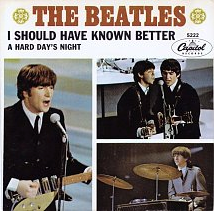
"I Should Have Known Better" is a song by English rock band the Beatles composed by John Lennon and originally issued on A Hard Day's Night, their soundtrack for the film of the same name released on 10 July 1964. "I Should Have Known Better" was also issued as the B-side of the US single "A Hard Day's Night" released on 13 July.
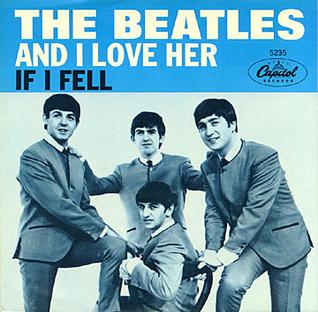
"And I Love Her" is a song recorded by English rock band the Beatles, written primarily by Paul McCartney and credited to the Lennon–McCartney partnership. It is the fifth track of their third UK album A Hard Day's Night and was released 20 July 1964, along with "If I Fell", as a single release by Capitol Records in the United States, reaching No. 12 on the Billboard Hot 100.
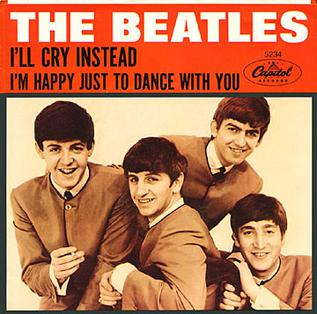
"I'll Cry Instead" is a song written by John Lennon, and recorded by the English rock band the Beatles for their third studio album, A Hard Day's Night (1964), a part-studio and part-soundtrack album to their film of the same name (1964). In the United States, the song originally appeared in the US version of A Hard Day's Night before it was released as a single backed with "I'm Happy Just to Dance with You" along with the US album Something New.

"All I've Got to Do" is a song written by John Lennon and performed by the English rock band the Beatles on their second British album, With the Beatles (1963). In the United States, "All I've Got to Do" originally appeared on Meet the Beatles! (1964). According to Dennis Alstrand, the song is the first time in rock and roll or rock music in which the bass player plays chords as a vital part of the song.
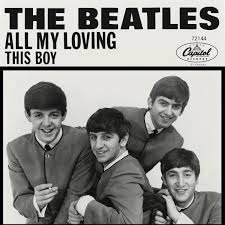
"All My Loving" is a song by the English rock band the Beatles, from their second UK album With the Beatles (1963). It was written by Paul McCartney, and produced by George Martin. Though not officially released as a single in the United Kingdom or the United States, the song drew considerable radio airplay, prompting EMI to issue it as the title track of an EP. The song was released as a single in Canada, where it became a number one hit. The Canadian single was imported into the US in enough quantities to peak at number 45 on the US Billboard Hot 100 in April 1964.

"Little Child" is a song by the English rock band the Beatles from their 1963 UK album With the Beatles. It was written by John Lennon and Paul McCartney for Ringo Starr, but Starr was instead given "I Wanna Be Your Man" as his album song.
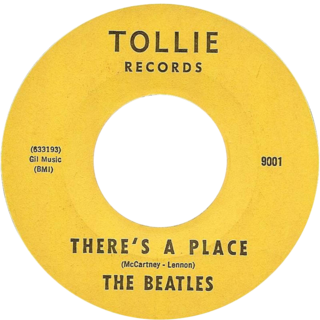
"There's a Place" is a song by the English rock band the Beatles from their debut album, Please Please Me, released in March 1963. It was written primarily by John Lennon and credited to McCartney–Lennon. In the United States, the song was released in July 1963 on the group's first US LP, Introducing... The Beatles, later reissued in January 1964 as Beatlemania surged there. It was also issued as a non-album single in the US, in March 1964, as the B-side to "Twist and Shout", reaching number 74 in the Billboard Hot 100.

"All Together Now" is a song by the English rock band the Beatles written primarily by Paul McCartney and credited to the Lennon–McCartney partnership. The song was recorded during the band's Magical Mystery Tour period, but remained unreleased until it was included on the Yellow Submarine soundtrack. It was released as a single in 1972 in European countries such as France and Germany, backed by "Hey Bulldog".

"Don't Let Me Down" is a song by the English rock band the Beatles, recorded in 1969 during the Let It Be sessions. It was written by John Lennon and credited to the Lennon–McCartney songwriting partnership. The band recorded the song with keyboardist Billy Preston; the single release with "Get Back" was credited to "the Beatles with Billy Preston". Originally released as a B-side, producer Phil Spector excluded the song from Let It Be. The song's first appearance on an album was on the 1970 collection Hey Jude.

Beatles for Sale is an EP released 6 April 1965 by the Beatles. It is the group's eighth official EP and contains four tracks from the parent LP of the same name. The EP is only available in mono. Its catalogue number is Parlophone GEP 8931. It was also released in Australia and India.

















